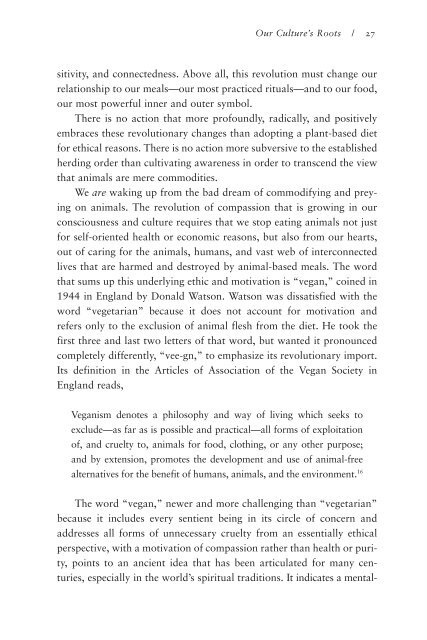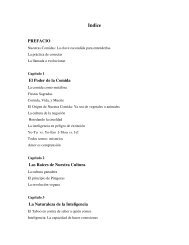- Page 3 and 4: This work, The World Peace Diet, by
- Page 5 and 6: Lantern Books has elected to print
- Page 7 and 8: 2005 Lantern Books One Union Square
- Page 10 and 11: TABLE OF CONTENTS PREFACE . . . .
- Page 12 and 13: Table of Contents / ix chapter seve
- Page 14: Table of Contents / xi Chapter Four
- Page 17 and 18: xiv / the world peace diet but is s
- Page 19 and 20: xvi / the world peace diet and ours
- Page 22 and 23: chapter one FOOD’S POWER “The
- Page 24 and 25: Food’s Power / 3 Sacred Feasts As
- Page 26 and 27: Food’s Power / 5 and creatures ar
- Page 28 and 29: Food’s Power / 7 nuts, macadamias
- Page 30 and 31: Food’s Power / 9 The Culture of D
- Page 32 and 33: Food’s Power / 11 the extreme con
- Page 34 and 35: Food’s Power / 13 sensitive, and
- Page 36 and 37: Food’s Power / 15 mare or stallio
- Page 38 and 39: chapter two OUR CULTURE’S ROOTS
- Page 40 and 41: Our Culture’s Roots / 19 word pec
- Page 42 and 43: Our Culture’s Roots / 21 mals (fo
- Page 44 and 45: Our Culture’s Roots / 23 dominate
- Page 46 and 47: Our Culture’s Roots / 25 vibratio
- Page 50 and 51: chapter three THE NATURE OF INTELLI
- Page 52 and 53: The Nature of Intelligence / 31 mod
- Page 54 and 55: The Nature of Intelligence / 33 foo
- Page 56 and 57: The Nature of Intelligence / 35 tha
- Page 58 and 59: The Nature of Intelligence / 37 aro
- Page 60 and 61: The Nature of Intelligence / 39 gen
- Page 62 and 63: The Nature of Intelligence / 41 tio
- Page 64 and 65: The Nature of Intelligence / 43 sio
- Page 66 and 67: The Nature of Intelligence / 45 In
- Page 68 and 69: The Nature of Intelligence / 47 the
- Page 70 and 71: The Nature of Intelligence / 49 tee
- Page 72 and 73: chapter four INHERITING OUR FOOD CH
- Page 74 and 75: Inheriting Our Food Choices / 53 eg
- Page 76 and 77: Inheriting Our Food Choices / 55 un
- Page 78 and 79: Inheriting Our Food Choices / 57 uc
- Page 80 and 81: Inheriting Our Food Choices / 59 So
- Page 82 and 83: Inheriting Our Food Choices / 61 ha
- Page 84 and 85: Inheriting Our Food Choices / 63 to
- Page 86 and 87: Inheriting Our Food Choices / 65 Ou
- Page 88 and 89: The Intelligence of Human Physiolog
- Page 90 and 91: The Intelligence of Human Physiolog
- Page 92 and 93: The Intelligence of Human Physiolog
- Page 94 and 95: The Intelligence of Human Physiolog
- Page 96 and 97: The Intelligence of Human Physiolog
- Page 98 and 99:
The Intelligence of Human Physiolog
- Page 100 and 101:
The Intelligence of Human Physiolog
- Page 102 and 103:
The Intelligence of Human Physiolog
- Page 104 and 105:
The Intelligence of Human Physiolog
- Page 106 and 107:
The Intelligence of Human Physiolog
- Page 108 and 109:
The Intelligence of Human Physiolog
- Page 110 and 111:
The Intelligence of Human Physiolog
- Page 112 and 113:
The Intelligence of Human Physiolog
- Page 114 and 115:
The Intelligence of Human Physiolog
- Page 116 and 117:
chapter six HUNTING AND HERDING SEA
- Page 118 and 119:
Hunting and Herding Sea Life / 97 o
- Page 120 and 121:
Hunting and Herding Sea Life / 99 a
- Page 122 and 123:
Hunting and Herding Sea Life / 101
- Page 124 and 125:
Hunting and Herding Sea Life / 103
- Page 126 and 127:
Hunting and Herding Sea Life / 105
- Page 128 and 129:
Hunting and Herding Sea Life / 107
- Page 130 and 131:
chapter seven THE DOMINATION OF THE
- Page 132 and 133:
The Domination of the Feminine / 11
- Page 134 and 135:
The Domination of the Feminine / 11
- Page 136 and 137:
The Domination of the Feminine / 11
- Page 138 and 139:
The Domination of the Feminine / 11
- Page 140 and 141:
The Domination of the Feminine / 11
- Page 142 and 143:
The Domination of the Feminine / 12
- Page 144 and 145:
The Domination of the Feminine / 12
- Page 146 and 147:
The Domination of the Feminine / 12
- Page 148 and 149:
The Domination of the Feminine / 12
- Page 150 and 151:
The Domination of the Feminine / 12
- Page 152 and 153:
The Domination of the Feminine / 13
- Page 154 and 155:
The Domination of the Feminine / 13
- Page 156 and 157:
chapter eight THE METAPHYSICS OF FO
- Page 158 and 159:
The Metaphysics of Food / 137 trate
- Page 160 and 161:
The Metaphysics of Food / 139 reduc
- Page 162 and 163:
The Metaphysics of Food / 141 When
- Page 164 and 165:
The Metaphysics of Food / 143 anima
- Page 166 and 167:
The Metaphysics of Food / 145 decid
- Page 168 and 169:
The Metaphysics of Food / 147 mask,
- Page 170 and 171:
The Metaphysics of Food / 149 relat
- Page 172 and 173:
The Metaphysics of Food / 151 Thus,
- Page 174 and 175:
Reductionist Science and Religion /
- Page 176 and 177:
Reductionist Science and Religion /
- Page 178 and 179:
Reductionist Science and Religion /
- Page 180 and 181:
Reductionist Science and Religion /
- Page 182 and 183:
Reductionist Science and Religion /
- Page 184 and 185:
Reductionist Science and Religion /
- Page 186 and 187:
Reductionist Science and Religion /
- Page 188 and 189:
The Dilemma of Work / 167 be shield
- Page 190 and 191:
The Dilemma of Work / 169 down ther
- Page 192 and 193:
The Dilemma of Work / 171 The stunn
- Page 194 and 195:
The Dilemma of Work / 173 mals who
- Page 196 and 197:
The Dilemma of Work / 175 Factory f
- Page 198 and 199:
The Dilemma of Work / 177 people co
- Page 200 and 201:
The Dilemma of Work / 179 well as w
- Page 202 and 203:
The Dilemma of Work / 181 temporary
- Page 204 and 205:
chapter eleven PROFITING FROM DESTR
- Page 206 and 207:
Profiting from Destruction / 185 pe
- Page 208 and 209:
Profiting from Destruction / 187 a
- Page 210 and 211:
Profiting from Destruction / 189 re
- Page 212 and 213:
Profiting from Destruction / 191 br
- Page 214 and 215:
Profiting from Destruction / 193 Ne
- Page 216 and 217:
Profiting from Destruction / 195 we
- Page 218 and 219:
Profiting from Destruction / 197 to
- Page 220 and 221:
chapter twelve SOME OBJECTIONS ANSW
- Page 222 and 223:
Some Objections Answered / 201 fort
- Page 224 and 225:
Some Objections Answered / 203 gori
- Page 226 and 227:
Some Objections Answered / 205 mal
- Page 228 and 229:
Some Objections Answered / 207 face
- Page 230 and 231:
Some Objections Answered / 209 eat
- Page 232 and 233:
Some Objections Answered / 211 Tert
- Page 234 and 235:
Some Objections Answered / 213 ing
- Page 236 and 237:
Some Objections Answered / 215 nect
- Page 238 and 239:
Some Objections Answered / 217 almo
- Page 240 and 241:
Some Objections Answered / 219 the
- Page 242 and 243:
Evolve or Dissolve / 221 actions un
- Page 244 and 245:
Evolve or Dissolve / 223 tems, the
- Page 246 and 247:
Evolve or Dissolve / 225 Ends and M
- Page 248 and 249:
Evolve or Dissolve / 227 rational k
- Page 250 and 251:
Evolve or Dissolve / 229 cultivate
- Page 252 and 253:
Evolve or Dissolve / 231 breathing,
- Page 254 and 255:
Evolve or Dissolve / 233 deep praye
- Page 256 and 257:
Evolve or Dissolve / 235 group of p
- Page 258 and 259:
Evolve or Dissolve / 237 ice cream,
- Page 260 and 261:
Evolve or Dissolve / 239 stock/capi
- Page 262 and 263:
Evolve or Dissolve / 241 consciousn
- Page 264 and 265:
Evolve or Dissolve / 243 inate, the
- Page 266 and 267:
Journey of Transformation / 245 exp
- Page 268 and 269:
Journey of Transformation / 247 Con
- Page 270 and 271:
Journey of Transformation / 249 ing
- Page 272 and 273:
Journey of Transformation / 251 bra
- Page 274 and 275:
Journey of Transformation / 253 emb
- Page 276 and 277:
Journey of Transformation / 255 ity
- Page 278 and 279:
Journey of Transformation / 257 nei
- Page 280 and 281:
Journey of Transformation / 259 pot
- Page 282 and 283:
Journey of Transformation / 261 of
- Page 284 and 285:
Journey of Transformation / 263 att
- Page 286 and 287:
Journey of Transformation / 265 pra
- Page 288 and 289:
Journey of Transformation / 267 wha
- Page 290 and 291:
chapter fifteen LIVING THE REVOLUTI
- Page 292 and 293:
Living the Revolution / 271 motivat
- Page 294 and 295:
Living the Revolution / 273 pollute
- Page 296 and 297:
Living the Revolution / 275 atively
- Page 298 and 299:
Living the Revolution / 277 known a
- Page 300 and 301:
Living the Revolution / 279 Heifer
- Page 302 and 303:
Living the Revolution / 281 for hun
- Page 304 and 305:
Living the Revolution / 283 which i
- Page 306 and 307:
Living the Revolution / 285 ent dir
- Page 308 and 309:
Living the Revolution / 287 “food
- Page 310 and 311:
Living the Revolution / 289 rather,
- Page 312 and 313:
Living the Revolution / 291 somewha
- Page 314:
Living the Revolution / 293 will co
- Page 317 and 318:
296 / the world peace diet 14. Maso
- Page 319 and 320:
298 / the world peace diet 14. Andr
- Page 321 and 322:
300 / the world peace diet 10. See
- Page 323 and 324:
302 / the world peace diet Little,
- Page 325 and 326:
304 / the world peace diet 6. Peopl
- Page 327 and 328:
306 / the world peace diet 37. “T
- Page 329 and 330:
the world would long since have bee
- Page 331 and 332:
310 / the world peace diet Inside a
- Page 334 and 335:
SELECTED BIBLIOGRAPHY Adams, Carol
- Page 336 and 337:
Selected Bibliography / 315 Fujita,
- Page 338 and 339:
Selected Bibliography / 317 Rampton
- Page 340 and 341:
Index - The World Peace Diet by Dr.
- Page 342 and 343:
commodification of animals, 22-23,
- Page 344 and 345:
fear, 147 feasts, sacred, 4 feed, a
- Page 346 and 347:
of vegetarian children, 298n23 inte
- Page 348 and 349:
medical opposition to, 57-58, 89 nu
- Page 350 and 351:
writings on, 167 slavery and dehuma



